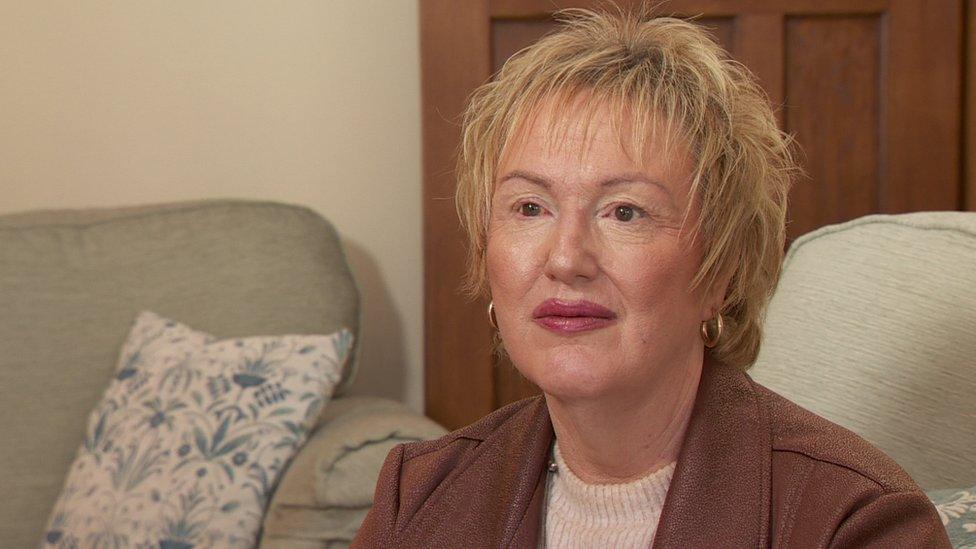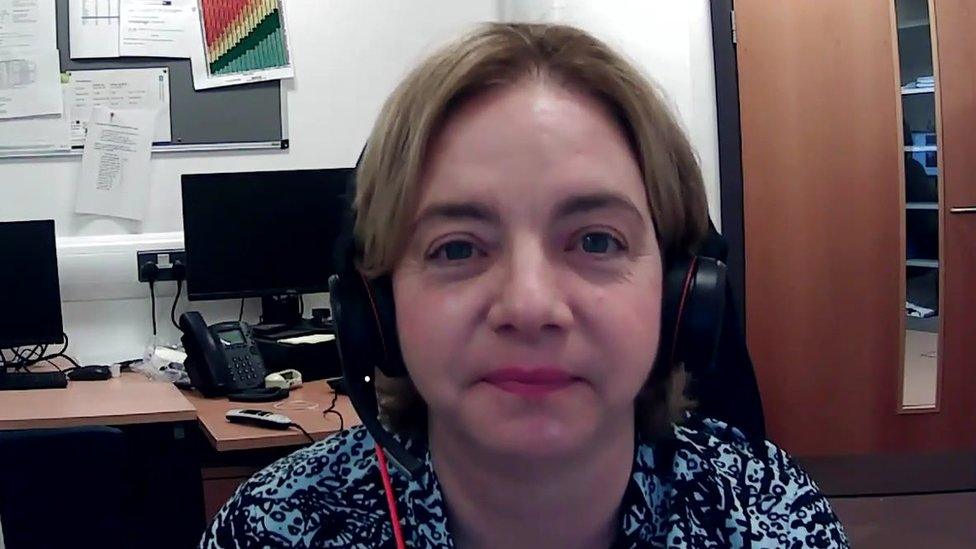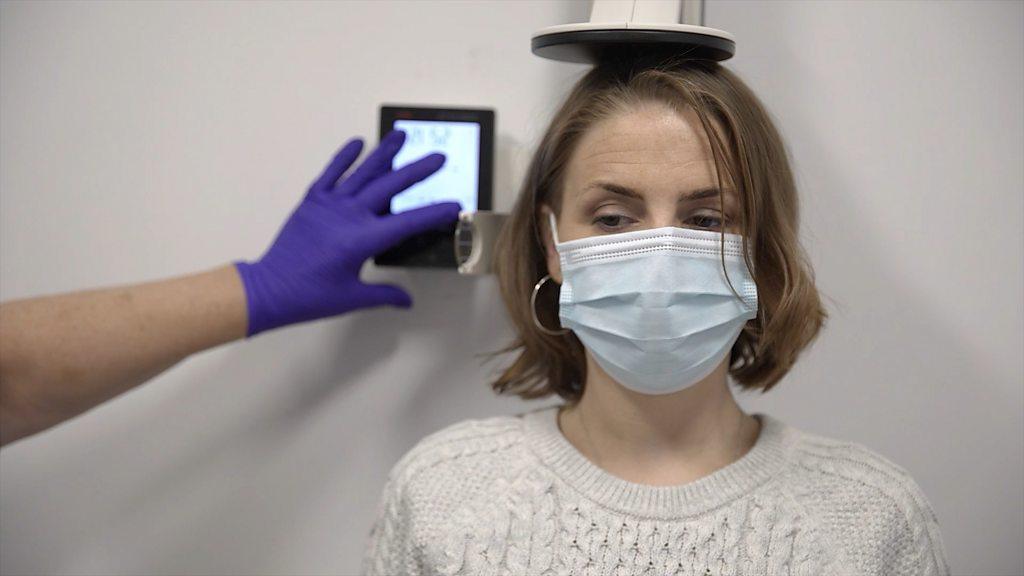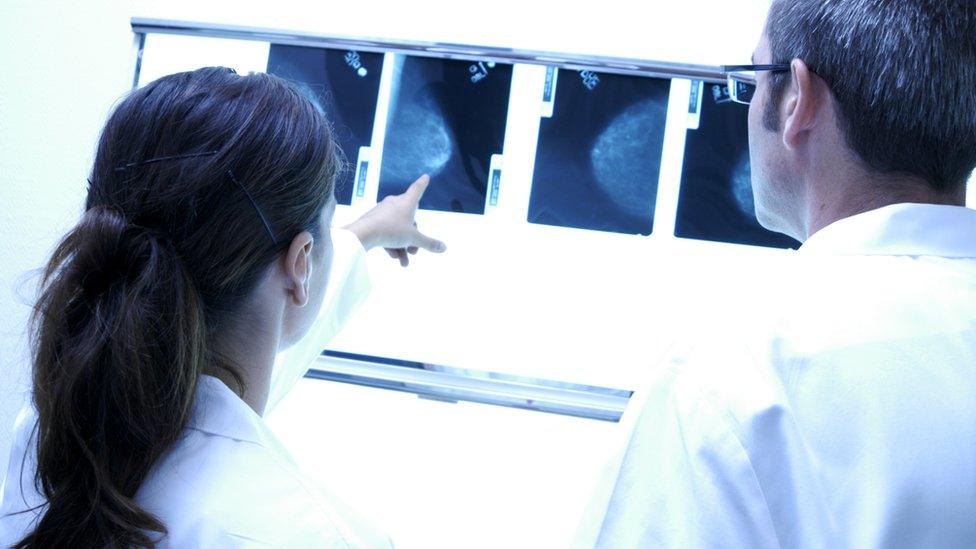Secondary breast cancer audit in NI 'could change women's prognosis'
- Published
Secondary breast cancer: The women fighting for a special audit
Women with secondary breast cancer have called for a special audit of how many people in Northern Ireland are living with the disease.
A group representing women with cancer said no official statistics exist.
Beaconbridge secondary breast cancer group believes patients "need to be counted" to help shape health services.
One of the women, Julie Ann Lillis, said more information could change women's prognosis from a "death sentence" to a "chronic disease".
The Department of Health said data collection was a central focus of its 10-year cancer strategy.
Julie Ann and her fellow members have called for Health Minister Robin Swann to make a commitment to establishing an audit.
The women's main concern is that some may not have a great deal of time for this audit to be completed.
It's estimated that 35,000 people in the UK are living with secondary breast cancer (SBC), with approximately 31 people dying each day from the disease.
SBC indicates the cancer has spread from the primary source - the breast - to other parts of the body.
'No time to waste'
For the first time, patients with secondary breast cancer in England and Wales are going to be counted in a special audit funded by the NHS.
Campaigners, including those in Northern Ireland, have fought for a decade for the audit, which they say will improve patient treatment and support.
Julie Ann, 38, told BBC News NI there was no time to waste and Northern Ireland needed to collect data immediately in order to design services and a future workforce.
There is a history of breast cancer in Julie Ann's family - both her mum and sister have been diagnosed with it.
Her test for the BRCA gene was positive.
In September 2020, during the coronavirus pandemic, Julie Ann was confirmed as having breast cancer.
Within 10 months of a clear scan to finding a lump, she was diagnosed with stage four cancer.
Two months later she was told it had spread.

Liz Doran says the group has hope but "we can't have politicians lose hope in us"
"It just stopped my world and completely turned it upside down," she said.
Julie Ann said she was helping to lead the charge in the hope "she can make a change if not for herself then for others".
"I want to help as much as I can - while I am here," she said.
The Department of Health said it was not possible for Northern Ireland to be included in the NHS England audit because "we do not currently have the required legislation regarding the secondary use of data".
"In addition, the necessary data hasn't been collected in Northern Ireland," the department added.
It said a commitment had been made to carry out a review of the use of data in cancer healthcare, including a formal review of the Northern Ireland Cancer Registry's role.
'I don't have the luxury'
Beaconbridge group members offer each other physical, mental and emotional support.
Within the last month, two of the members have died from the disease.
Liz Doran, from Belfast, said members of the group were devastated and their hearts were breaking for the children and husbands left behind.
"I get frightened at night or when I see my son and think I will never see my grandchildren," she said.
"I want this audit to happen and soon. I don't have the luxury to sit around and wait for decisions to be made.
"We have hope within this group. We just can't let our politicians lose hope in us."
'Not second best'
A consultant breast surgeon at the Belfast Health trust told BBC News NI that the group was an important source of support.

Dr Samantha Sloan says women with secondary breast cancer need peer support
Dr Samantha Sloan said one of the women had said to her "they may have secondary breast cancer but they are not second best".
"They appreciate they have a life-limiting illness but they still have time they can utilise," she said.
"To do that they need peer support, they need to know how many they are within the region and then can we widen the net to look at clinical trials and other things that can involve that group of individuals specifically that are different from primary breast cancer trials?"
The women also said they do not have time to be fighting for medication they said was more accessible for women in England.
Liz said it was thanks to the campaign led by Northern Ireland cancer advocate Melanie Kennedy, who died from secondary breast cancer in 2020, that she got access to a drug that she believes is keeping her alive.
She added: "Not a day goes by when I am sitting up and about to take my medication that I don't think of her and thank her."
The Department of Health said responsibility for commissioning all drug therapies in Northern Ireland was with the Health and Social Care Board (HSCB).
The HSCB is guided by the National Institute for Health and Care Excellence (NICE) in what drugs should be adopted.
The department has a formal link with NICE under which its technology appraisals are reviewed locally for their legal and policy applicability here.
"Where found to be applicable they are endorsed by my department for implementation within the health and social care system," the department said.
"All new licensed cancer medicines, including extensions to existing licenses, are appraised by NICE to assess the clinical and cost effectiveness of the medicine (a technology appraisal).
"In circumstances where NICE has not yet fully appraised, or does not recommend a particular drug, it is not routinely commissioned for use here.
"However, the individual funding request process provides a mechanism to consider requests from clinical consultants for treatments for individual patients that fall outside the range of services routinely commissioned."
Related topics
- Published7 October 2021

- Published25 August 2021
